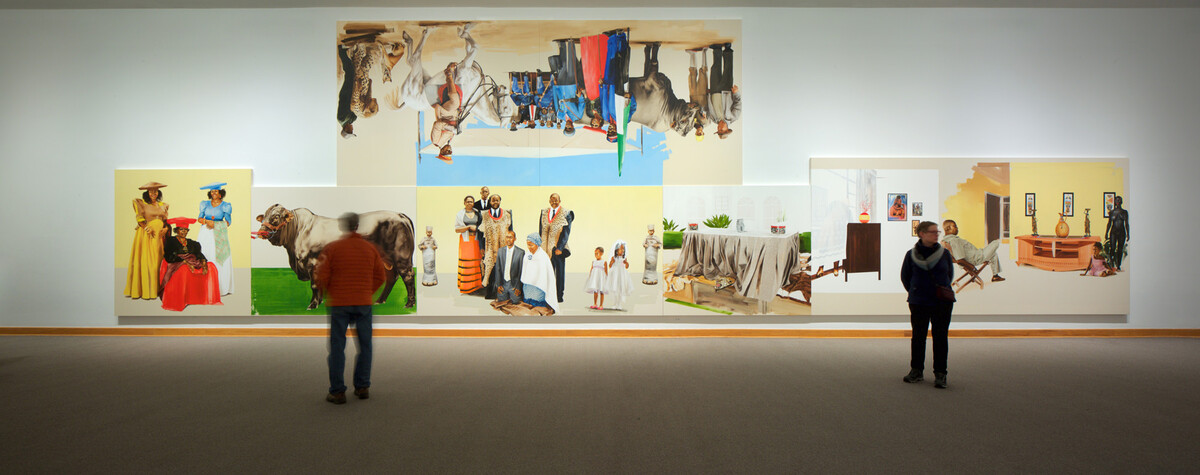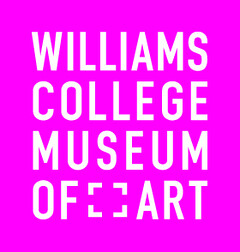Lex and Love
March 17–September 17, 2017
15 Lawrence Hall Dr.
Williamstown, Massachusetts 01267
USA
T +1 413 597 2429
F +1 413 597 5000
wcma@williams.edu
The Williams College Museum of Art (WCMA) presents together for the first time, two new chapters in Meleko Mokgosi’s Democratic Intuition project. Lex and Love were conceived specifically for WCMA’s 5,500 square-foot galleries. Mokgosi (Botswana, b. 1981), is known for his monumental installations of exquisitely-rendered large-scale paintings. Democratic Intuition, the most recent of Mokgosi’s multi-chapter projects, considers the slippery concept of democracy as an idea that is inscribed in individuals through institutions, ideology, and culture. Lex and Love are the third and fourth chapters in the project that asks how one can approach ideas of the democratic in relation to the daily-lived experiences of people living in southern Africa.
Comprised of three multi-panel installations, Lex derives its title from the legal concept of lex loci actus, or the law of the place where an alleged act occurred. The paintings reflect on how the rules of a community, specifically around labor and gender, govern the actions of individuals and the degree to which they have agency to negotiate their circumstances. Love, or Lerato in the artist’s native language Setswana, is made up of seven works that use allegory and Lacanian psychoanalysis to investigate the various forms that love takes—filial, brotherly, familial, romantic, as well as love of community, homeland, and nation.
Two of the works in Love refer directly to paintings by William-Adolphe Bouguereau (French, 1825–1905), known for his sensual depictions of women and realistic genre scenes inflected with allegory and classical themes. Mokgosi’s re-interpretations of The Motherland (1883), which depicts the allegorical figure of Mother France surrounded by her child subjects and The Assault (1898), a depiction of the birth of love, similarly represented through a central female figure covered in adoring children, stay true to the French painter’s composition and realistic treatment of the body. Mokgosi, however, adds elements of abstraction into the background and alters the race of the central figures from white to black. Mokgosi draws here on the history of art as well as 19th century colonial politics. Bouguereau represented the art establishment of his day, a market darling: pleasant, realist, backward-focused. Mokgosi’s project considers the development and subsequent institutionalisation of European Modernism, which begins with the rejection of artists such as Bouguereau. Mokgosi also notes that The Motherland was painted one year prior to the Berlin Conference, which formalised the partitioning of the African continent into European colonies. By altering the race of the main subject of the painting, he reminds us, that although race might not be at the forefront of our minds when we look at the original Bouguereau, it was always already there.
Mokgosi’s rigorous conceptual practice is steeped in psychoanalytic and post-colonial theory. He imposes strict rules on his process. Each composition is painstakingly arranged in a cinematic form of storyboarding. He starts with an unprimed surface, leaving no room for error once his brush touches the canvas. Emerging from a vast archive of photo-documents, the people, animals, objects, and places he depicts are real but their relationships to one another are wholly invented. Jarring juxtapositions and unexpected orientations inhabit his compositions, complicating attempts at assigning specific meaning to them. At the core of Mokgosi’s project is the implication that deriving a single conclusive reading of this, or any, work of art is impossible, and yet the medium of painting has a great deal to tell us about our social, cultural, political, and artistic selves. By way of the grand traditions of history painting and modernist abstraction, his work questions Eurocentric notions of representation. Elusive and seductive in equal measure, Mokgosi’s art exists in the space between what we know and what might be imagined.
About the artist
Meleko Mokgosi (born in Francistown, Botswana) lives and works in New York and teaches studio practice at New York University’s Gallatin School of Individualized Study. He received his BA from Williams College and advanced degrees from the Whitney Independent Study Program and UCLA. His artwork has been exhibited nationally and internationally at venues including the Botswana National Gallery, The Studio Museum in Harlem, the Armand Hammer Museum of Art and Culture Center, Yerba Buena Center for the Arts, and the Lyon Museum of Contemporary Art.



